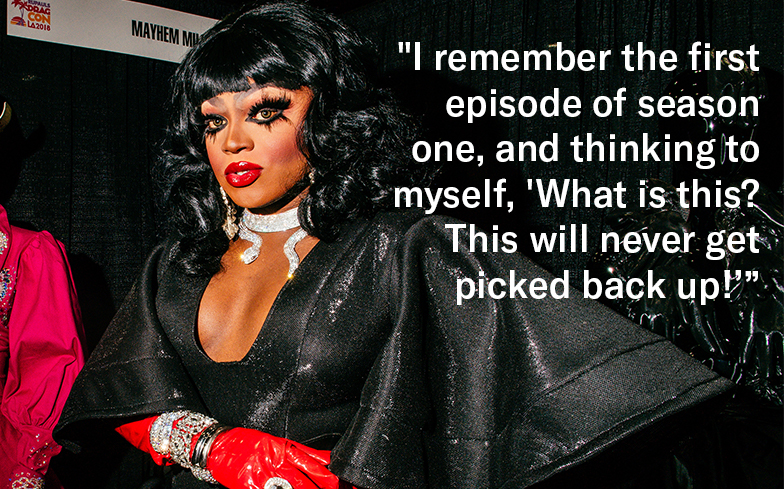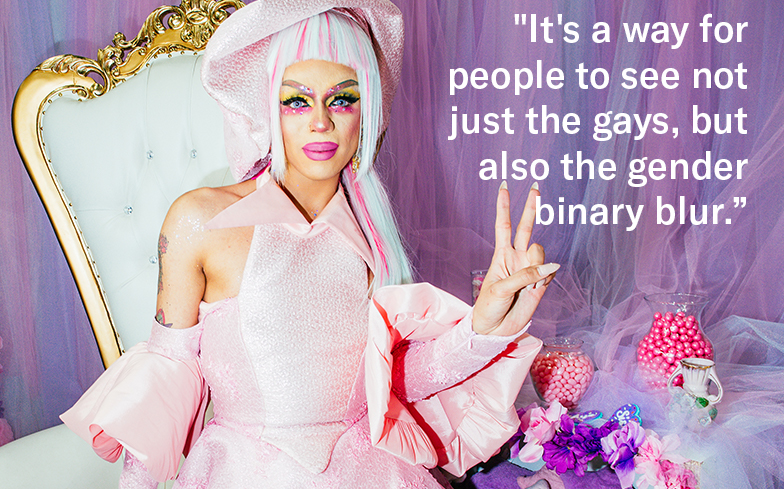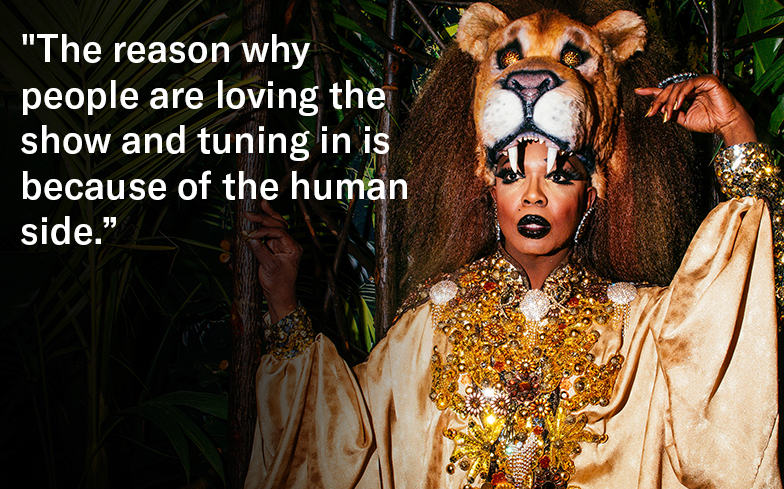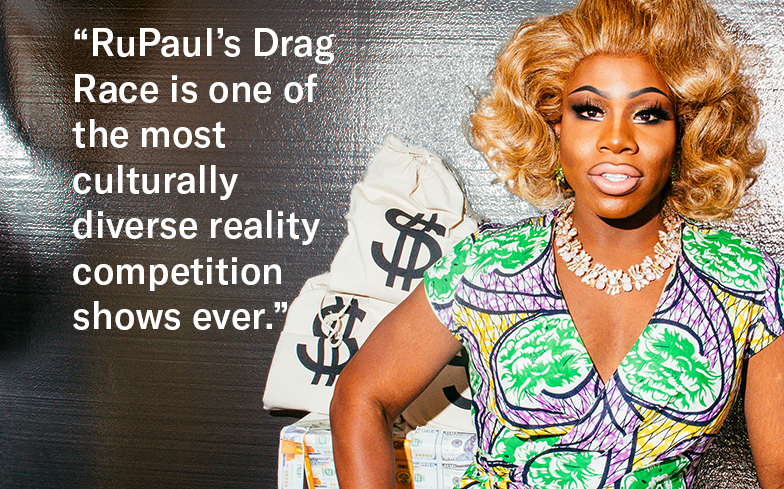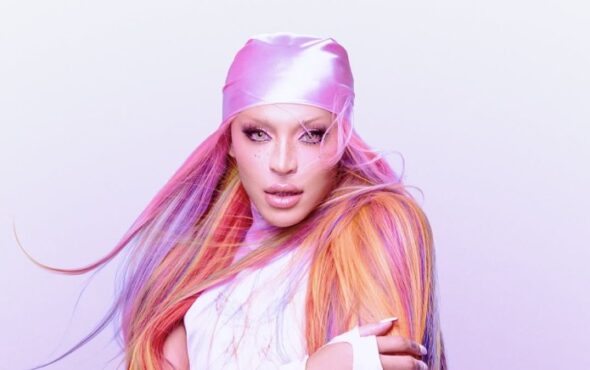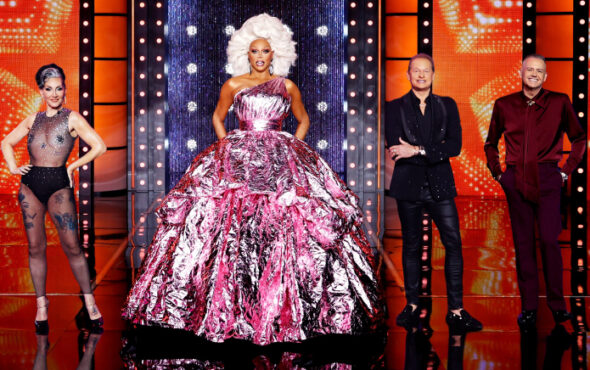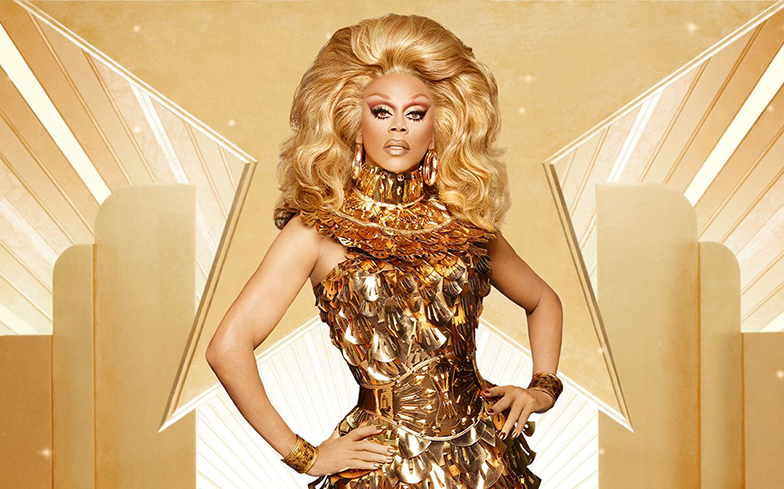
When RuPaul’s Drag Race debuted back in 2009, no-one knew how much impact it would have on the LGBTQ community and popular culture.
A reality show documenting infamous drag performer RuPaul in his search for “America’s Next Drag Superstar” sounded like another soon-to-be cult series with a ‘save it from cancellation’ change.org petition to shortly follow. “I remember the first episode of season one, and thinking to myself, ‘What is this? This will never get picked back up!’” season 10 contestant Mayhem Miller tells us. “Then, season two came around, and I saw all my closest friends on there. I realised it would be major for America.” How off were we? Nine years later, and RPDR has finished its tenth sickening season, has been renewed for an 11th – as well as a fourth for its All Stars spin-off – and is responsible for boosting the careers of 126 drag queens. See? Way off.
Over the course of a decade, RuPaul has left viewers positively cooped, gooped and mother-tucking gagged at so many iconique moments throughout Drag Race HERstory: Shannel’s Miss Mandarin; “Tyra is a complete bitch”; MacArthur Park; “Go back to party city where you belong!”; Alyssa and Coco’s lip-sync showdown; Lajanja’s meltdown; Violet’s tartan reveal; Sasha’s So Emotional lip-sync petal extravaganza; Read U Wrote U; BenDeLaCreme’s self-elimination; and – say it with us now – “Miss Vaaaaaaaaaaanjie”.
These iconic moments have had an unprecedented impact on the LGBTQ community, and are arguably responsible for bringing drag queens into the zeitgeist and the forefront of popular culture. The show has become the highest-rated television program on Logo TV and airs internationally in countries such as Australia, Brazil, Canada, Finland, Germany, Hungary, Ireland, Latin America, Spain, Sweden, the Philippines, the UK and Thailand. Urm, did someone say ‘global’? Honestly, we could go on… Shall we? Yeah, we’ll go on. For two consecutive years, RuPaul has been honoured with an Emmy for Outstanding Host – beating out A-List stars Steve Harvey, Jane Lynch, Heidi Klum, Ryan Seacrest, Gordon Ramsey and Martha Stewart – and the show has been nominated for four Critics’ Choice Television Awards and a Creative Emmy. Legendary stars have also made guest-appearances on the show, such as Ariana Grande, Lady Gaga, Christina Aguilera, Kesha, Khloe Kardashian, Demi Lovato and Adam Lambert. So yeah, when we say the show has thrust our queens into the zeitgeist, we are – in the words of Coco Montrese – “not joking bitch!”
“I think one of the most important things, for me, about Drag Race is because it’s gone mainstream, it has created and allowed drag to go mainstream,” season ten contestant Blair St. Clair tells us over the phone. “Drag is all about the illusion, breaking gender stereotypes, and it’s all about fluidity.” Blair credits the series as having shown viewers that being feminine or a drag queen doesn’t “make you less of a person, less of a man” or “less equal in power”. “We’ve shown that feminine people playing in a gender illusion do not have to necessarily be submissive people. Femininity has been seen as negative in the past,” she added. Mayhem said it’s “crazy” how an art-form can change “perceptions of a lot of people, and people who aren’t even LGBTQ”, and when we kiki’d with season nine and All Stars 3 henny Aja, she agreed, calling the show a “gateway for the mainstream”. “It’s a way for people to see not just the gays, but also the gender binary blur,” she explained. “It interests me how many heterosexual, cisgender people are viewing the shows these days, even the straight men.”
The NYC queen also praised the show for educating heteronormative viewers on issues that are happening in our community, such as: HIV/AIDS; depression and suicide; gender confirmation surgery; sexual assault; racism; homophobia and terrorism; same-sex marriage; conversion therapy; and persecution for being gay. “When people are exposed to that, they become more educated about our community,” Aja continued. “It’s like the whole issue around the word ‘tranny’, and how people say it but they don’t realise it’s not an appropriate thing to say – they’re just not educated.” The show’s focus on contemporary conversations within the community has, in turn, managed to bring us all closer together – which is precisely why it has achieved an unprecedented tenth season, according to Bebe Zahara Benet. “The reason why people are loving the show and tuning in is because of the human side,” the Jungle Kitty tells us. “Season one had that heart. Ongina coming out with HIV, speaking about her issues. Me talking about my history with Africa. It was the heart. People were able to relate to us as human beings.”
Season five champion Jinkx Monsoon credits the show with humanising drag queens and showing the performer “behind the persona”, as well as informing viewers on how drag queens create their own “suit of armour to tackle the world”. Speaking to us for her Gay Times cover shoot last month, she explained: “Underneath all of it, there’s still a person, a multifaceted, multidimensional person. While we’re drag queens, we’re also artists, creators, thinkers, speakers, advocates, leaders. We’re all those things, plus we’re drag queens.” American YouTube sensation (and Drag Race guest star) Tyler Oakley echoes their thoughts, and says he views the show as an “incredible glimpse into queer life”. “It’s deeper for so many people, partly because it offers escape,” he says. “They really have some deep moments where I think everybody would benefit from watching, whether it’s people opening up about their coming out experiences, or people talking about their religion or their race and how that intersects with being queer. It starts conversations within the queer community that are really necessary.” Yes, other groundbreaking LGBTQ shows have touched upon important issues – such as Will & Grace, Queer Eye and Queer As Folk – but they’ve arguably not touched upon as many, or been as inclusive of the whole community.
“I think it’s worth acknowledging that RuPaul’s Drag Race is one of the most culturally diverse reality competition shows ever,” Monet X Change tells us. “There were seven queens of colour on my season: the five black girls, Yuhua and Kalorie.” When we caught up with season two, three and All Stars 3 queen Shangela earlier this year, she also noted the diversity of the cast, especially the queens who won the crown. “The show has a great track record of having outstanding winners from diverse backgrounds,” she stated. “The winners of the main seasons, we’ve had Bebe Zahara Benet, we’ve had Tyra Sanchez, we’ve had Raja, we’ve had Bob The Drag Queen, we’ve had Bianca Del Rio. But even more so than just the winners, we have so much diverse talent across the Drag Race legacy, and I’m proud to be a part of that.”
That being said, the show – or rather its host – has faced criticism for its lack of inclusiveness for the trans community. Earlier this year, RuPaul left many fans disappointed when he revealed that he “probably [would] not” let a post-transition woman compete on the show, and suggested that he only considers trans women ‘real’ women once they’ve physically transitioned. When we interviewed Courtney Act back in March, she said RuPaul’s conversations about women’s bodies is “alarmingly in line with the current swing of conservative politics”. Spilling the T further, she added: “The public erasure of trans women from the history of drag and then the irony of Ru, a male, telling women, cis and trans, they can’t do drag because it’s not as big of a fuck you to male dominated world. Very controversial.” While Peppermint – who became the show’s first openly trans contestant during season nine – argues that the show isn’t about “trans folk or trans issues”, she does hope that the show will become more inclusive in the future. “I don’t know if they’re planning on changing it soon, but I would personally like to see all kinds of queens on the show – not only different types of drag queens but different types of people doing drag.”
Despite longing for more trans representation, Peppermint does acknowledge that the show “brings a diverse cross-section of queer folk into the homes of millions every week with a balance of queerness and irresistible entertainment”, and says it provides “the most powerful and consistent launch for the careers of so many”. The proof, as they say, is in the pudding. Earlier this year, Courtney historically won the 21st season of Celebrity Big Brother UK, a feat achieved by no other drag performer. Her season six sister, Adore Delano, received widespread acclaim from critics for her debut album, Till Death Do Us Party, which racked up over 10 million streams on Spotify, and charted at #59 on the Billboard 200 – a higher position than any RuPaul album. Bianca Del Rio used her platform to launch a book, a feature film, a follow-up to that feature film, and three comedy tours. To top it all off, World of Wonder announced their upcoming seasonal slate of programming this week, which sees several fan-favourite legacies receive their own show. Viral queen Vanessa “Miss Vanjie” Mateo will headline the platform’s new docuseries Follow Me, Miz Cracker will provide fans with makeup tips in JewTorials, and Aja will spill all the T in her conversational series Ayo Sis. And we’ve not even mentioned the fandom yet…
This year, RuPaul’s DragCon tripled its total attendance since debuting three years ago when 50,000 fans travelled from around the world to meet their favourite queens. And no honey, that was not a typo. 50-mothertucking-thousand fans came to a drag queen convention. Ten years ago, that would’ve been unheard of. “When you go to DragCon and you see kids loving drag, wanting to do drag, calling me Jungle Kitty, it’s worth it every single day,” Bebe reveals. Monique Heart agrees, and says she knew the whole experience was “truly worth it” when she was able to meet the fans and hear how the show has impacted their lives and coming out journeys. “You have little boys come up to you, and even grown men, saying ‘Your story was so powerful and it touched me’. These young, gay drag boys, they would just hold my hand and cry and say, ‘You don’t even know’. Like, that moment, I go ‘Boom’.”
The power of queer visibility in the mainstream cannot be understated. Finally the youth have positive role models to look to when they start discovering their own sexual orientation and/or gender identity. Case in point, American singer-songwriter Leland – co-writer of iconic Drag Race numbers Kardashian: The Musical, VH1 Divas Live and Kitty Girls says the show also helped him become the person he is today. “Being a part of the show is such an honour because it affected me positively before I even worked for it,” he tells us. “My journey in coming to terms with, not only my sexuality, but being confident and liberated by it, that is something that Drag Race helped. It helped me get through that door of excitement about being out of the closet.” When RuPaul proclaims at the end of every episode, “If you can’t love yourself, how in the hell are you gonna love somebody else?” it’s become a modern-day mantra of self-acceptance – much needed in this troubled political climate.
As the show continues to grow in popularity, so does the expectation of it to represent the full spectrum of our vibrant and varied initialism. Just between us squirrel friends, it’s done a great job so far. But as with anything that is expected to evolve and be relevant for the time in which it exists, it will undeniably need to develop further. RuPaul isn’t perfect, but we’ve never seen representation on this scale before. The show he has built has brought so much brightness (and shade), entertainment, and even in some cases a lifeline to queer youth. Through the queens’ stories, we as a community have gained so much strength, empathy, laughter and one-liners, and long may that continue.
“It just keeps getting bigger and bigger, which is crazy! I just see it growing, and it’s amazing to see it branch out with Drag Race Thailand, it would be amazing to see a Drag Race UK, which everyone has been waiting for for years,” Detox tells us on the phone. “There’s all kinds of opportunities!”
So while you go backstage to untuck in the Interior Illusions Lounge, we’ll let RuPaul deliberate with the Drag Race judges on where they are headed next. Can we get an Amen up in here?
The season 10 finale of RuPaul’s Drag Race is now available on Netflix UK.
Related: Yaaas! RuPaul’s Drag Race has been renewed for season 11.
